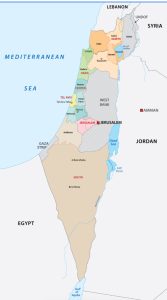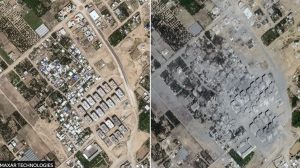Air raid sirens blasted through the streets of Israel on the morning of Oct. 7, as Hamas, a Muslim terrorist group, launched land, sea and air attacks on the Jewish state. Zvika Glickman, resident of Tel Aviv, awoke to these piercing wails, “scrambling to regain his composure” as he and his wife swiftly pulled their two young children from slumber and rushed to their government-mandated safe room. Listening to the missiles fall around their home, Glickman “sensed immediately that a grave event was unfolding.”
In the weeks that have passed since Hamas’ initial attack Israel has launched over 7,000 air strikes at Gaza. In an Oct. 28 interview with the New York Times, a Gazan field researcher for human rights organization B’Tselem, Olfat al-Kurd, described the Israeli Government’s retaliations as a war “being waged…against [Gazan] civilians,” claiming that Israel “[doesn’t] distinguish between combatants and civilians” in their attacks. Gazan’s fear has only been amplified in recent days as Israeli missiles have caused information blackouts across the Gaza strip.
Many people feel that there is no right answer to this war. Civilians have become cannon fodder, and there is more terrorism than war.
Outside of Israel, Jews around the world are struggling to come to terms with the conflict in Israel. Our state, Oregon, is home to approximately 40, 600 Jews. I am one such Jewish Oregonian. The scene I awoke to the morning of Oct. 8 was likely mirrored in Jewish homes across the world. My mother shook me awake to the news of rockets raining down on Israel. On Tel Aviv. I watched the CNN newsfeed on the TV and felt a tightness in my chest. Worry for my family and friends in Israel overtook me. My parents and grandparents went into a frenzy of texts, emails and phone calls, attempting to reach our loved ones in Israel and confirm their safety.
Only four months ago I had visited Israel and met the family and friends about whom I had heard numerous stories. I spent time in many of the locations directly affected by this abhorrent act of terror. Even though I am 10,000 miles away, the act felt very personal in a way that occurs when your home or sanctuary is violated.
Later, Glickman and the world would learn that by the time the air raid sirens sounded, over 2,000 members of the Muslim terrorist organization Hamas had infiltrated Israel, resulting in the tragic loss of more than 1,400 lives in just hours. That toll included innocent children, women and elderly individuals. However, the genesis of the conflict dates back 70 years and has resulted in complicated politics and moral dilemmas surrounding the Gaza Strip and the treatment of its inhabitants.
In Israel’s turbulent history, air raids are commonplace, but the terrorism of Oct. 7 was a dramatic departure from prior acts. Hamas carried out an unprecedented plan systematically targeting soft, civilian areas with a level of sophistication and logistics that clearly pointed to outside support. However, the events of October 7th can not be understood without the context of the preceding 70 years.

Before becoming a Jewish state, the land of Israel was named Palestine and was created by a mandate from Great Britain. But in 1948, after the genocide of six million Jews by the Nazis, the UN voted to hand over Palestine and create two states—one Jewish and one Arabic. The Palestinian Arabs were not happy with this decision. With the support of many of the surrounding
Arab countries, war was waged on the new Jewish state. The following decades brought many more wars and battles between the Jewish state and opposing groups, but the Israelis, with the backing of the United States, always claimed victory, and the opposition, often Palestinians, were the ones to suffer.
With every battle, the Palestinians were pushed into smaller and smaller territories. Now, the remaining Palestinian population has been confined to two areas; the Gaza Strip and the West Bank. The conflict of today is in the Gaza Strip, and the oppression experienced by those who call Gaza home. One of the most densely populated regions in the world, with over two million people inhabiting this strip only 25 miles long, 80 percent of Gazans live in poverty, 47 percent are children and 46 percent of the workforce is unemployed. The conditions of today’s Gaza stem from decades of occupation and countless wars between Palestine and Israel. Overpopulated and oppressively restricted by the Israeli government, Gaza is a pressure cooker of anger, despair and poverty, the necessary ingredients for radicalism. And so Hamas was born.
Following the events of Oct. 7 and the Israeli government’s declaration of war against Hamas, over 8,000 Gazans have died to date. Satellite images of Gaza show entire neighborhoods flattened to rubble from Israeli excessive use of bombs, missiles, and artillery. Those who have survived the explosions suffer without power, functioning medical facilities, working sewage systems, food and water, all strategically taken away by Israel’s military. The Israeli minister of defense Yoav Gallant has even referred to the Gazans as “human animals” that should be treated as such, dehumanizing Gazans in order to make it seem as though their murder is reasonable. No matter how it’s phrased, killing innocent civilians in Gaza is not going to solve this crisis.

The fighting is deadly and brutal, with the Washington Post reporting approximately 1.4 million of Gaza’s 2.3 million population “internationally displaced.” In an interview with NPR, Fidaa Al-Araj, a resident of Gaza City, said, “My daughter said to me, ‘What are you waiting for? Yesterday, we were crying for our cousins. Do you want people to cry over our dead bodies today?’ So I had to leave.” This was shortly after her cousin’s house had been bombed, killing his wife, mother, and children.
Egypt has opened its border to Gaza’s refugees, but Hamas has restricted the egress of Gazans from their homeland. With destruction at every turn, Gaza has fallen into an economic tailspin with the cessation of all business and civilian activities — its civilians are thirsty and hungry as Israel’s blockade prevents the UN food aid upon which Gazans depend.
The unabashed terrorism committed by Hamas has no sensible justification. Similarly, the communal punishment of the entire population for the acts committed by a minority lacks moral grounding. Furthermore, such large-scale indiscriminate destruction will likely result in the creation of new generations of radicals, hell-bent on the destruction of the Jewish State. I have felt tremendous internal struggle as I have watched the sufferings of innocent Gazans while also worrying about the safety of my loved ones in Israel. In the wise words of my grandmother: “Repeated wrongs never make a right.”
































